
Any business leader hoping to return to ‘traditional’ ways of working is on a fast-track to failure. That horse has bolted. Not only have employees re-evaluated the concept of work, but they have the experience that proves digital technologies enable a fundamental change in workplace model that is both beneficial and efficient. How does mandating that reluctant employees return to the office therefore fit with the need for increased productivity to counter the impact of inflation? How is imposing office attendance helping to improve retention and reduce the excessive costs associated with recruitment and on-boarding?
Companies need to look hard at the bottom line. Employees’ values have changed. They want hybrid working and a digital experience that works from both a cultural and technology perspective, irrespective of how often they are in the office. Failure to invest in the quality of that digital employee experience is costing businesses not only in reduced productivity but plummeting morale, employee loss and reputational damage.
The ‘office versus hybrid’ debate is irrelevant. Moreover, it sits in contrast to business leaders’ priorities for 2023 and beyond. As the Future of Work evolves, Dave Page, Founder & Chief Strategy Officer, Actual Experience, insists that true competitive differentiation is being achieved by companies investing in understanding and improving each employee’s unique digital experience of their working environment.
Destructive Disconnect
Are companies really hoping that a recession will reset the employment model, remove the need to ‘pander’ to employee desires for hybrid working and compel everyone to be in the office five days a week? A lack of access to talent and the problems with recruitment and retention have been headline issues for years – and talent attraction remains the Number One priority for Chief Human Resources Officers (CHRO) for at least the next 24 months according to Lace Partners. However, the Employee Value Proposition (EVP) has changed: it is no longer limited to pay and benefits. Rather, the fact that 51% of UK adults have embraced work-life flexibility and want to work from home more frequently, according to Savanta ComRes – as opposed to only 8% who want to do so less – should be inspiring businesses to create a compelling digital experience and culture that boosts morale, productivity and talent retention.
Yet there are clear signs that some businesses are still failing to read the room. Recent figures from LinkedIn show that the number of remote opportunities may have passed its peak, with remote listings on its jobs site falling from 16% at the start of the year to 12% in December 2022. Research from Microsoft also shows managers are increasingly concerned about the performance of remote workers – arguably, though, without any empirical evidence to support this.
This disconnect between employee expectations and employer commitment is hugely damaging to long term business prospects. By ignoring the inevitable hybrid Future of Work, companies are overlooking the importance of creating a digital environment that truly supports the needs and desires of the workforce. How many businesses know which of their employees’ productivity is being hindered by poor Wi-Fi and by how much? What is the bottom-line cost of employees’ varying digital experiences? Essentially, employees want a hybrid experience but they don’t want to simply swap the stress of the commute for the stress of remote technology problems. Do companies know which employees are poised to jump ship as a result?
Digital Experience
In 2022, the Harvard Business Review said, “Technology defines the employee experience” in the hybrid digital workplace. The problem for every business is that the experience is inconsistent. Every employee has a different home set up, different ways of embracing remote working tools, even a different preference for the number of days at home and in the office. But who knows how well each individual’s digital experience is helping – or hindering – their day to day ability to perform to the best of their capabilities?
Businesses are operating blind. In a hybrid environment, CHROs have no insight into the human work experience – the subjective satisfaction that employees gain from their work. Workplace surveys are too generic and no longer representative of an employee’s unique work experience, meaning HR leaders have no way of measuring satisfaction or productivity. What, for example, is the impact of the technology problems suffered by 89% of staff when working remotely?
When 46% say these technology problems are very or fairly stressful and over 50% say these issues affect productivity, there is clearly a problem. But businesses have no visibility of who is struggling, when and why. They don’t know how much productivity is being lost. How much stress is caused. The impact on morale, commitment or engagement. With IT environments set up to gather engineering data rather than valuable subjective insight, it is increasingly clear that the digital workplace is not fit for the Future of Work.
Employee Value Proposition
It is now imperative that HR and IT come together to understand every employee’s digital experience. By identifying how each individual feels about their digital workplace, in detail and continuously, a company gains an extraordinary depth of knowledge. They can quickly identify individuals who are struggling because they feel isolated within the digital environment due to sound or video problems during client and/or colleague calls. They can identify pockets of digital inequality and assess the impact on each individual.
For HR, there is immediate insight into which employees need support to minimise their stress and prevent burnout, simply to remain on par with colleagues who have a better digital experience. Combining the information with payroll, time in the business or demographics can highlight issues with diversity. For IT, understanding the day-to-day experience can highlight the number of days productivity lost each year – information that can be combined with payroll to reveal the bottom-line impact and support a business case for investment, by employee, team, department or the entire business.
Furthermore, by understanding in detail how the home and office blend of hybrid work evolves over time, employee by employee, office by office, a company can continually fine tune its digital employee experience. Whether that is providing dedicated IT support to specific home working employees, evolving the culture to improve motivation and job satisfaction or building a strong employer brand value, continuous visibility of every employee’s digital experience provides the foundation for creating an EVP that truly meets the Future of Work.
Conclusion
Businesses need to act now. Just as companies had to adapt or die in response to the technology driven disruption of Amazon, Uber, Google and Airbnb, so technology is fundamentally disrupting the digital employee experience. Great employees are not satisfied with a generous salary and benefits. They want an employer that embraces digital technology and adapts to create a business culture based on more than just turning up to an office.
Right now, this is still a work in progress. There is no consensus around what ‘good’ looks like which means laggard companies have time to catch up. But those businesses that are proactively investing in understanding the digital experience are transforming the Future of Work. They are committed to optimising the employee experience and rewriting the EVP. And, as a result, they are best placed to attract talent and boost productivity.
The contrast between these innovators and those still harking after ‘traditional’ working is already stark. In 12 months, it could be too late. This is a once in a generation for CHROs and CIOs to come together and deliver a transformative digital employee experience.



















